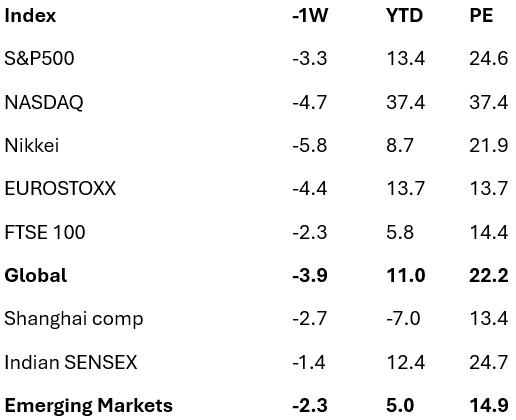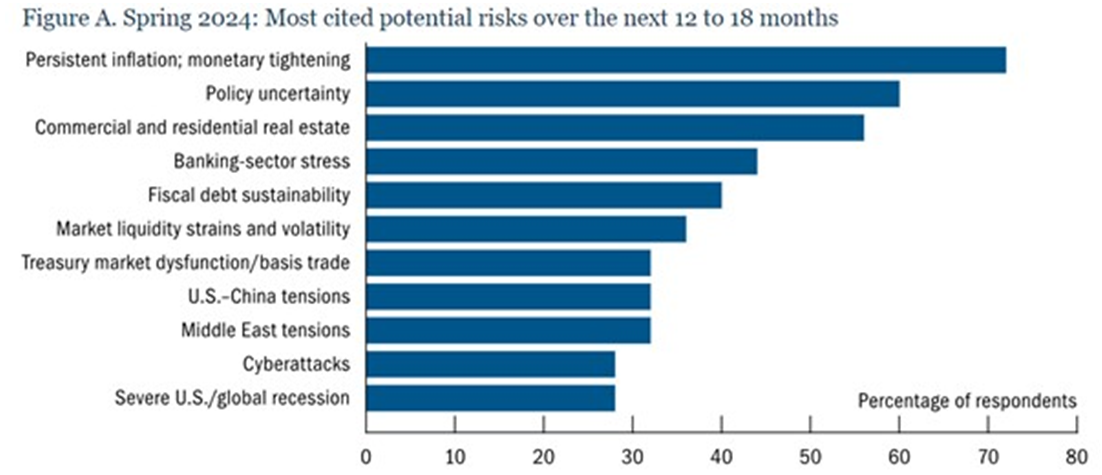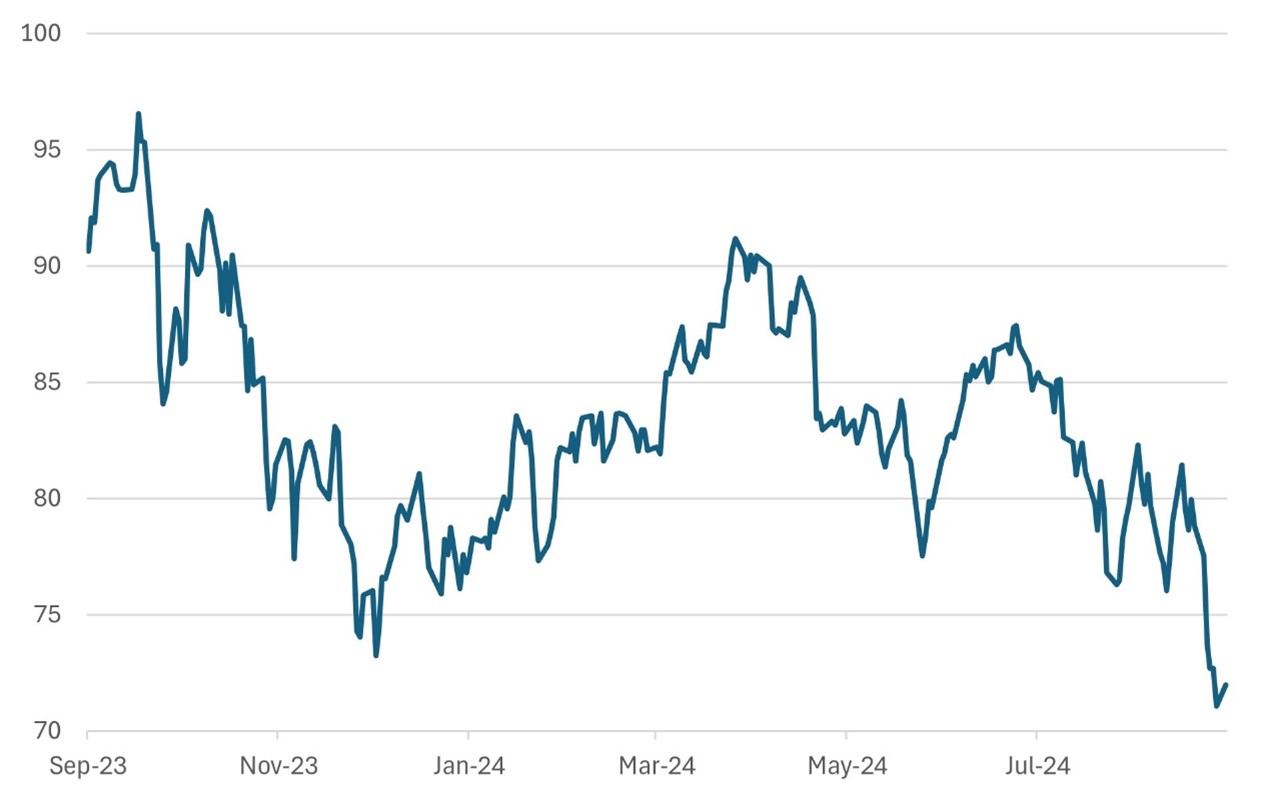By Falco
09 Sep 2024
• Investors fret that US economic data does not emphatically push the Fed to provide a 50bps rate cut this month
• Marked profit-taking in the equity markets suggests that investors want to see an acceleration of monetary easing
• A slow pace of monetary easing is a concern for many who worry about the impact of high rates on sectors such as commercial real estate
• Large cash balances provide support for bonds
Last week's sell-off of equities was a shade perverse. Ordinarily, you would think that better-than-expected economic data would encourage global equity indices to rise. However, the market would have preferred weaker data to guide the Fed to cut soon and aggressively. In the event, a stronger-than-expected US employment report and a reasonable level of ongoing confidence in the service sector had economists' views converging on a likely 25bps rate cut at the next meeting rather than 50bps.
The growth concerns are not just about the US. Economic data in China and Germany remains poor, with JP Morgan estimating that their growth rates are tracking at 3% and 1%, respectively, hardly sufficient to compensate for the slower growth in the US. With oil prices tracking lower than expected, the hope must be that central bankers will see lower inflation risk and step up and provide a more significant boost to growth through a quickened pace of monetary easing.
One could use the setback as a buying opportunity, but only in markets that offer clear view – potentially Japan; European markets may only selectively offer that opportunity.
Table 1: Last week’s Broad sell-off of Equity Markets

Source: Bloomberg
What is it that the market is most worried about? The market is probably right to fret that interest rates are not going to come down quickly enough. As we mentioned in last week's Weekly, the cuts in interest rates from the peak have typically coincided with equity markets selling off rather than rallying. Part of the issue in the past was that the Fed's rate cuts were either too late or insufficient to stop a financial crisis from taking hold.
According to a survey by the US Federal Reserve earlier this year, the most cited risk by counterparties to the Fed was the persistence of inflation and monetary tightening (Chart 1). We may have less inflation, but we also have a late start and potentially very measured pace of Fed rate cuts.
Chart 1: Fed Survey of sentiment amongst financial sector counterparties

Source: Bloomberg
Should we be worried about US financial sector stress? Well, on the surface, no; based on the Fed’s stress test of the large banks earlier this year all the major banks have sufficiently strong balance sheets to absorb unfavourable market conditions. The Fed’s stress scenarios tested for a 36% decline in US home prices, a 55% drop in equity prices, and a 10% unemployment rate. However, the smaller banks are still a weak link in the financial system as we saw in early 2023 when a mark to market on bond market losses caused 10 days of angst before a bailout was announced.
Smaller banks remain at the epicentre of a potential commercial real estate (CRE) crisis. With $4.7 trillion in commercial mortgages out there and $1 trillion maturing before the end of 2025, significant rate cuts can’t come quickly enough. According to some estimates, around 40-70% of CRE loans in the US are issued by these banks, which are more vulnerable to rising defaults. While large banks have been increasing their provisions for real estate write-downs, the more vulnerable banks are under less regulatory scrutiny. As a Harvard Business survey noted in July 2024, “CRE loan losses for the largest banks spiked to 0.6% in early 2024, while other banks are reporting virtually zero losses. By comparison, such losses topped 1.4% in 2010”.
Investors’ risk appetite is clearly down with money market funds the main winner from the redirected flows. In the US, Money Market Fund Assets (MMFA) jumped another $37 billion last week. MMFAs have increased by $166 billion in five weeks and $268 billion in four months.
Cash Accumulates as Bond Issuance Remains Elevated
In tandem with rising money market fund assets, the high-grade bond market has been busy with volumes of new issuance the third highest on record last Tuesday ($43bn). US state and local governments have also rushed to raise funding ahead of the US elections in November, with a record $325bn in issuance year-to-date.
Potentially, the low-risk portfolio strategy could be to take the bet that central bankers will eventually cut rates faster than the markets currently price. A 50bps rate cut at the next Fed meeting would certainly set a more progressive and positive tone.
Oil Prices Lower but not Necessarily for Longer
The prospect of lower-than-expected oil prices should prompt central banks to cut rates faster. Last week, a near-term glut in oil and concerns about global growth led to a nearly 10% drop in the Brent oil price. The drop seems a bit of an exaggeration of the fundamentals. OPEC+ already indicates that it will react to any weakness in oil prices and delay its production increases.
Seasonally, the oil market is always vulnerable as the summer driving season abates. However, US inventory data suggests that refiners saw faster draws on inventories, which potentially boosted near-term demand. Part of the oil market's weakness was driven by the assumption that global growth and, hence, oil demand would weaken because of recent weakness in global growth data. However, if policymakers were to react by cutting interest rates faster than previously thought, growth would revive and demand recover. Over the longer term, the market will also be mindful of the sharp increase in Indian demand growth, where domestic refining capacity is estimated to increase 22% over the next five years.
Chart 2: Brent Oil Price (USD bbl)
Source Bloomberg
Gary Dugan - Investment Committee Member
Bill O'Neill - Non-Executive Director & Investor Committee Chairman
9th September 2024
The information contained within is for educational and informational purposes ONLY. It is not intended nor should it be considered an invitation or inducement to buy or sell a security or securities noted within nor should it be viewed as a communication intended to persuade or incite you to buy or sell security or securities noted within. Any commentary provided is the opinion of the author and should not be considered a personalised recommendation. The information contained within should not be a person's sole basis for making an investment decision. Please contact your financial professional at Falco Private Wealth before making an investment decision. Falco Private Wealth are Authorised and Regulated by the Financial Conduct Authority. Registered in England: 11073543 at Millhouse, 32-38 East Street, Rochford, Essex SS4 1DB
